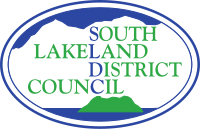
Back Южен Лейкланд (община) Bulgarian South Lakeland District CEB Ardal De Lakeland Welsh South Lakeland Danish South Lakeland German South Lakeland Spanish South Lakeland French South Lakeland Italian 사우스레이클랜드 Korean South Lakeland Dutch
54°18′43″N 2°52′48″W / 54.312°N 2.880°W
South Lakeland District | |
|---|---|
 Shown within Cumbria | |
| Sovereign state | United Kingdom |
| Constituent country | England |
| Region | North West England |
| Ceremonial county | Cumbria |
| Historic county | Lancashire (part) Westmorland (part) Yorkshire (part) |
| Founded | 1 April 1974 |
| Abolished | 31 March 2023 |
| Admin. HQ | Kendal |
| Government | |
| • Type | South Lakeland District Council |
| Area | |
• Total | 593 sq mi (1,535 km2) |
| Population (2021) | |
• Total | 104,676 |
| • Density | 180/sq mi (68/km2) |
| Time zone | UTC+0 (Greenwich Mean Time) |
| • Summer (DST) | UTC+1 (British Summer Time) |
| ONS code | 16UG (ONS) E07000031 (GSS) |
| Website | southlakeland.gov.uk |
South Lakeland was a local government district in Cumbria, England, from 1974 to 2023. Its council was based in Kendal. The district covered the southern part of the Lake District region, as well as northwestern parts of the Yorkshire Dales. At the 2011 Census, the population of the district was 103,658,[1] an increase from 102,301 at the 2001 Census.[2]
The district was created on 1 April 1974 under the Local Government Act 1972. It was formed from the Kendal borough, Windermere urban district, most of Lakes urban district, South Westmorland Rural District, from Westmorland, Grange and Ulverston urban districts and North Lonsdale Rural District from Lancashire, and Sedbergh Rural District from the West Riding of Yorkshire.
In April 2023, Cumbria was reorganised into two unitary authorities.[3] South Lakeland District Council was abolished and its functions were transferred to the Westmorland and Furness unitary authority.
- ^ UK Census (2011). "Local Area Report – South Lakeland Local Authority (E07000031)". Nomis. Office for National Statistics. Retrieved 27 March 2021.
- ^ UK Census (2001). "Local Area Report – South Lakeland Local Authority (E07000031)". Nomis. Office for National Statistics. Retrieved 27 March 2021.
- ^ "Next steps for new unitary councils in Cumbria, North Yorkshire and Somerset". GOV.UK. Retrieved 1 January 2022.
